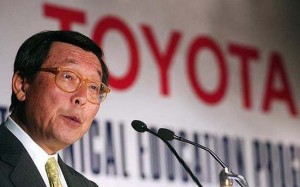Edolphus Towns (D-NY) said yesterday that a review of documents obtained under subpoena from a former lawyer at Toyota indicate that Toyota “deliberately withheld records” it was legally required to produce in response to discovery orders in litigation.
Where these latest charges lead is not immediately clear – and this matter is already subject to contentious litigation in California. However, without doubt this complicates the tarnished quality image and very real legal troubles that Toyota faces with respect to its handling of safety matters.
The National Highway Traffic Safety Administration is also looking at whether Toyota acted according to U.S. law while recalling six million Toyota and Lexus vehicles in the United States after it became aware of problems with the sticking accelerator pedals and uncontrolled vehicles. The vehicles in question have been subject to several, ever widening, recalls since last fall, and at least 34 deaths are now, alleged, to have resulted from Toyota safety defects in the U.S.
Many of the documents in question, which Towns in his press release did not provide, apparently contain specific comments on tragic “rollover” cases in which a driver or passenger was injured, including cases where victims were paralyzed.
The former Toyota lawyer in question, Dimitrios Biller, was Managing Counsel in the Product Liability Group of Toyota Motor Sales, USA (TMS), from April 2003 to September 2007.
In this position, Mr. Biller was part of the defense of some of the largest tort cases filed against Toyota, including “rollover” cases involving dead or seriously injured victims.
Viewers of TheDetroitBureau.com might recall that we reported at length last year, that Dimitrios Biller, the attorney involved in Toyota’s rollover litigation from 2003 to 2007 has a troubling prior history of suing employers, including the prosecutor’s office in California, where he also once worked before being dismissed. (Click here, and here.)
Congressman Towns, who – never ever forget – is up for re-election at a time when voters are clearly exasperated with ineffectual incumbents for their lack of action on financial regulation, fiscal responsibility and job creation, among other policy failures, subpoenaed Biller’s documents on Thursday, February 18, 2010 before the well-publicized hearing he chaired took place on February 24.
Former Toyota attorney Biller claims in his own separate and ongoing Federal fraud and racketeering case against Toyota in California that information had been withheld from accident victims in as many as 300 civil lawsuits.
Included in the cited — but we repeat unsupplied documents- is apparently a memo by Biller to his superiors at Toyota, noting that Toyota has failed to produce any e-mails or other electronic records in response to discovery orders.
Toyota has succesfully suppressed the full release of Biller matter documents in a California Federal court.
The Towns’ Committee now officially says it has found multiple references to heretofore-unknown “Books of Knowledge” that were kept electronically, in which Toyota engineers kept their design and testing data across all vehicle lines and for all vehicle parts.
The Committee also claims it now has evidence that Toyota entered into multi-million dollar settlements in tort cases when the company feared that the plaintiff’s lawyer was getting close to discovering the existence of the “Books of Knowledge.”
In a letter to Yoshimi Inaba, President and CEO, Toyota North America, who testified at the hearing last week, Towns asks Mr. Inaba to respond to the Biller documents and the “serious issues they raise.”
Specifically, Towns asks Inaba to personally review Biller’s records and provide a response to his allegations to the committee.
Taxpayers footing the bill for this very expensive and ongoing exercise should note that the Biller matter is also being pursued in a formal legal venue where rules of evidence about the admissibility of documents apply. U.S. court procedures – unlike Congressional hearings –provide for the cross examination of witnesses making claims such as Towns’ to allow for further exploration of the charges.
In addition, on a good day, such procedures separate the innocent from the guilty…


Toyota Statement on Letter From Chairman Towns:
Toyota takes its legal obligations seriously and strives to maintain the highest professional and ethical standards in its legal and regulatory practices. It is not uncommon, however, for companies to object to certain demands for documents made in litigation. Consistent with that philosophy, we take appropriate steps to maintain the confidentiality of competitive business information and trade secrets. We are confident that we have acted appropriately with respect to product liability litigation and our discovery practices and look forward to addressing Chairman Towns’ concerns.